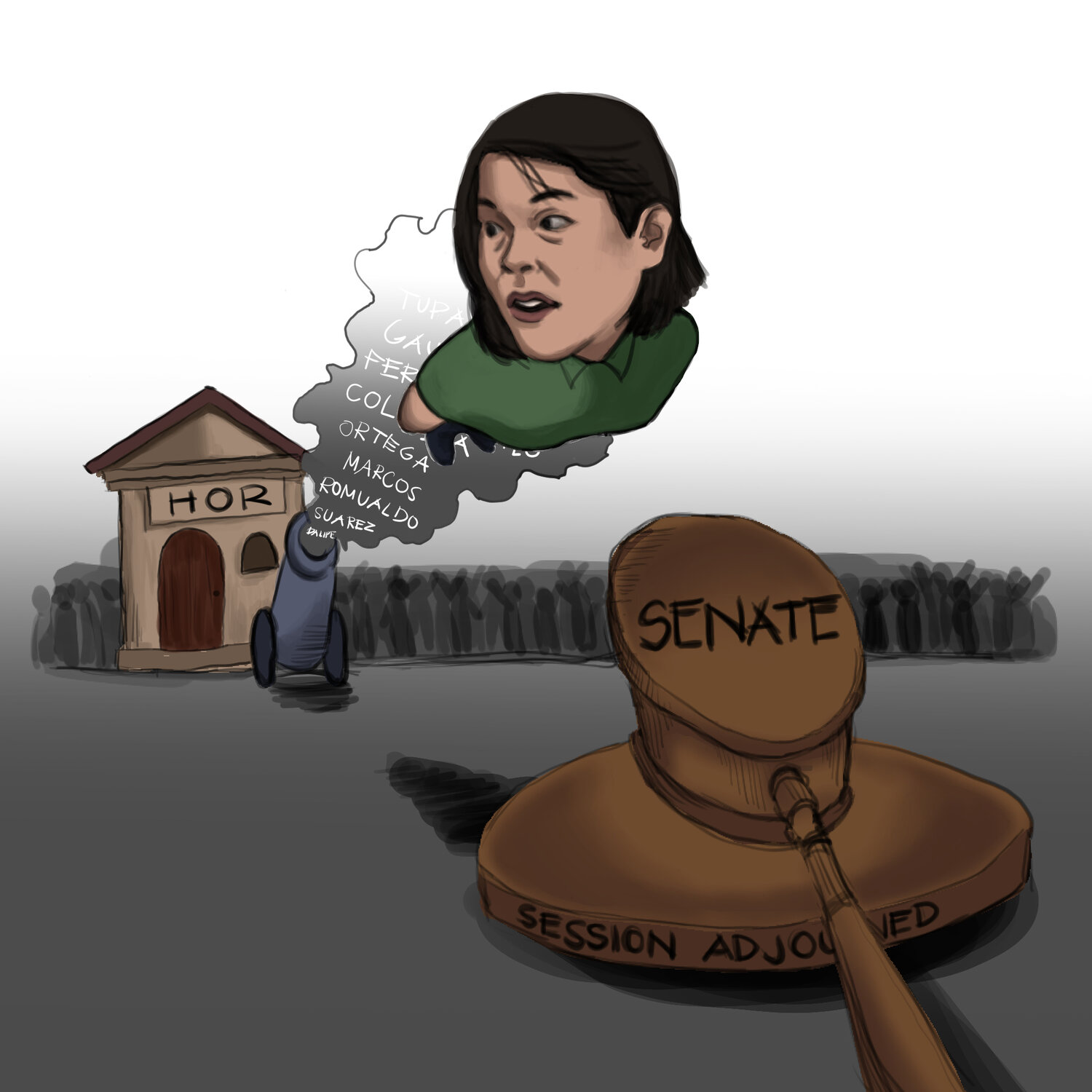By Malt John Vianney Solon
Backed by the articles of impeachment, the House of Representatives (HOR) impeached VP Sara Duterte last February 5, after 215 out of 306 lawmakers supported and forwarded the impeachment case to the Senate. With the case now in their hands, they are tasked to determine Duterte’s conviction or acquittal.
However, the Senate adjourned its plenary session until June 2, 2025—without taking action on the impeachment case—effectively leaving a four-month limbo. So, what happens next?
Before the HOR Impeachment
VP Sara’s impeachment case stemmed from complaints lobbied against her at the HOR, petitioned by sectoral, religious groups and families of extrajudicial killing victims. It was then endorsed by some of the Makabayan bloc’s members.
Following months of House inquiries into her alleged misuse of confidential funds as both VP and DepEd Secretary, investigations revealed security personnel handling the said funds and the presence of non-existent signatories on 405 receipts, findings considered a betrayal of public trust.
Despite the grave cases against her, Sara welcomed them last December, saying it would be a chance to address the accusations, with former President Rodrigo Duterte as one of her lawyers.
Despite her impeachment, several factors seemed to work against it, including President Marcos Jr.’s opposition and the support of nearly 2 million Iglesia ni Cristo followers, who rallied behind VP Sara in the National Rally for Peace last January 13, supporting Marcos’ stance against his VP’s impeachment.
Leading Senatorial Aspirants, Political Giants Reject Impeachment
In the upcoming May 2025 Philippine Senate elections, lawmakers from the HOR running for the senate did not sign the impeachment complaint, except those from the Makabayan bloc. Among the 91 who declined are leading senatorial aspirants Erwin Tulfo and Camille Villar, with Tulfo stating that he wanted to remain impartial should he become senator-judge.
Former President Gloria Macapagal-Arroyo, who also faced impeachment complaints during her presidency, led Luzon lawmakers in withholding support for the case. In a Facebook post, Congressman Paolo Duterte, Sara’s brother, called it “politically motivated” and “could shake the very foundation of [the Marcos’ administration’s] rule.”
The Partido Demokratiko-Lakas ng Bayan (PDP-Laban) urged Filipinos to elect senators who would vote to acquit Sara in the impeachment trial. Chaired by former President Rodrigo Duterte, the party claimed that her impeachment was meant to cover controversies and weaken her chances for the 2028 presidency. Currently, PDP-Laban’s Bong Go and Bato dela Rosa lead the nation’s senatorial preferences.
Marcos Denies Involvement
When asked about his influence on the impeachment case, Marcos said that he is given too much credit. Despite having strong political ties in the HOR, he asserted his non-involvement, stating, “Wala na akong pakialam doon.” He further emphasized that the decision rests with the congressmen as part of their responsibility in the HOR.
His son, Sandro Marcos, who was the first to sign the impeachment case, was advised by the president to “do your duty.” In an interview, Sandro reaffirmed his vote, citing Sara’s threat to exhume and discard his grandfather, former dictator Marcos Sr., into the West Philippine Sea.
Sara’s Pre-Valentine’s Press Con Hugot
“Alam n’yo? Mas masakit pa ang maiwanan ng boyfriend o girlfriend kesa ma-impeach ka ng House of Representatives,”
was Sara’s response when asked about her impeachment during her press conference last February 7.
During the press con, the VP jokingly stated “Mga Leni supporters pa ‘yan ha, pero tignan mo pumapalakpak pa sila sa akin,” after hearing claps from members of the Office of the Vice President.
In stark contrast to her online meltdown—where she threatened to kill President Marcos Jr., First Lady Liza Araneta-Marcos, and Speaker Martin Romualdez if an alleged assassination plot against her succeeded, a statement she now insists was not a threat against the president—Sara appeared composed and unfazed throughout the press con.
Senate Delays Impeachment Trial
With the next plenary session until June 2, Senate President Chiz Escudero said that the Senate will not conduct a trial during the break, saying “Hindi namin ito mamadaliin, pero hindi rin naman namin itong labis na iantala. Hindi kami magpapapressure na bilisan ito o i-delay ito.”
When asked if he would call for a special session should the Senate request to tackle the VP’s impeachment, Marcos replied he would. However, Escudero countered that special sessions are only held for urgent legislative matters, hinting that one would not be convened for the impeachment trial.
Contrary to Escudero’s statement, one of the framers of the 1987 Philippine Constitution emphasized that the Senate must immediately convene to start the impeachment trial. Former Commission on Elections commissioner Atty. Rene Sarmiento supported this, stating that the phrase “[…] the Senate shall forthwith proceed,” an excerpt from the constitution about impeachment, means “immediate” action.
The Senate’s Race Against Time
With the Senate resuming its plenary session on June 2, will they make it in time?
With the senate election coming, senators elected in 2019 will end their term on June 30, 2025, which means that they will only have 28 days to discuss the impeachment should they start on it on June 2.
In reaction, Escudero made pronouncements that during the break, the Senate can start with the rules, proceed with its approval, and take initiative on the pre-trial proceedings to refine the direction of the trial itself.
If proceedings begin on June 2, they must undertake the time-consuming process as an Impeachment Court—all within less than a month. This includes transmitting the Articles of Impeachment to the Senate Secretary, calling for an Impeachment Court session, issuing a summon to VP Sara (who has 10 days to respond), holding a pre-trial conference, conducting the trial itself, and ultimately reaching a final verdict.
All impeachment processes, all in less than a month.
Considering Escudero’s statements, they must fulfill their responsibility at breakneck speed—faster than you can say ‘impeachment.’
Should the Senate fail to complete the trial, the case resets the process back to zero, effectively shielding the VP from impeachment due to the one-year ban following a failed impeachment attempt. As a result, any new proceedings would face a significant delay.
Given the remaining days of the Senate, Escudero said that the impeachment trial will reach the 20th Congress of senators, which means that the elected senators in May will be part in voting for Sara’s conviction or acquittal.
VP Sara’s Advantage
VP Sara needs 9 votes to survive the impeachment trial by the Senate, and senators Bong Go, Bato dela Rosa, Imee Marcos, and Robin Padilla all said that they will not convict the VP. Should Go, dela Rosa, and Marcos be reelected in the upcoming elections, four of the needed votes she needs to end her case are already covered.
Taking advantage of the Senate’s limited lifetime and the upcoming elections, the Duterte camp might leverage time and influence by positioning their victory through delaying the process and making stronger campaigns for senators under the PDP-Laban slate.
Direct Hit or Just Smoke?
Considering the time restrictions and the introduction of new senators who might acquit Sara, there is a plausible possibility that her impeachment case will fail, making her immune to any impeachment cases for one year.
So, what is the impeachment really for? Is the impeachment aiming for a direct hit or just smoke?
If convicted, Sara would be disqualified from holding any public office, including the presidency. Otherwise, Sara might use her survival to rally her base even further. With 2028 on the horizon, could this impeachment case be the very cannon that launches her presidential bid—turning her impeachment into her catapult to the top?
Whatever the outcome, the House’s lawmakers reaffirmed their responsibility to make the second highest-ranking political official accountable for the misuse of confidential funds, involvement in extrajudicial killings, and threats on political officials, to name a few.
Sara’s impeachment case is now the hot spot of various political discussions, including the call by pro- and anti-Duterte Filipinos to support politicians who would either save or hold her accountable in the upcoming May 2025 National Elections.
Whether Sara emerges unscathed or falls from power, still, for the first time in Philippine history, a vice president has been impeached. Sara’s name is now etched in history—forever marked as ‘The First Impeached VP of the Philippines.’
“God save the Philippines.”


